Protein Cheesecake
This post may contain affiliate links. See my disclosure policy.
My protein cheesecake is rich and creamy and packs in over 30 grams of protein per serving! It’s a healthy and easy dessert recipe that comes together in no time.
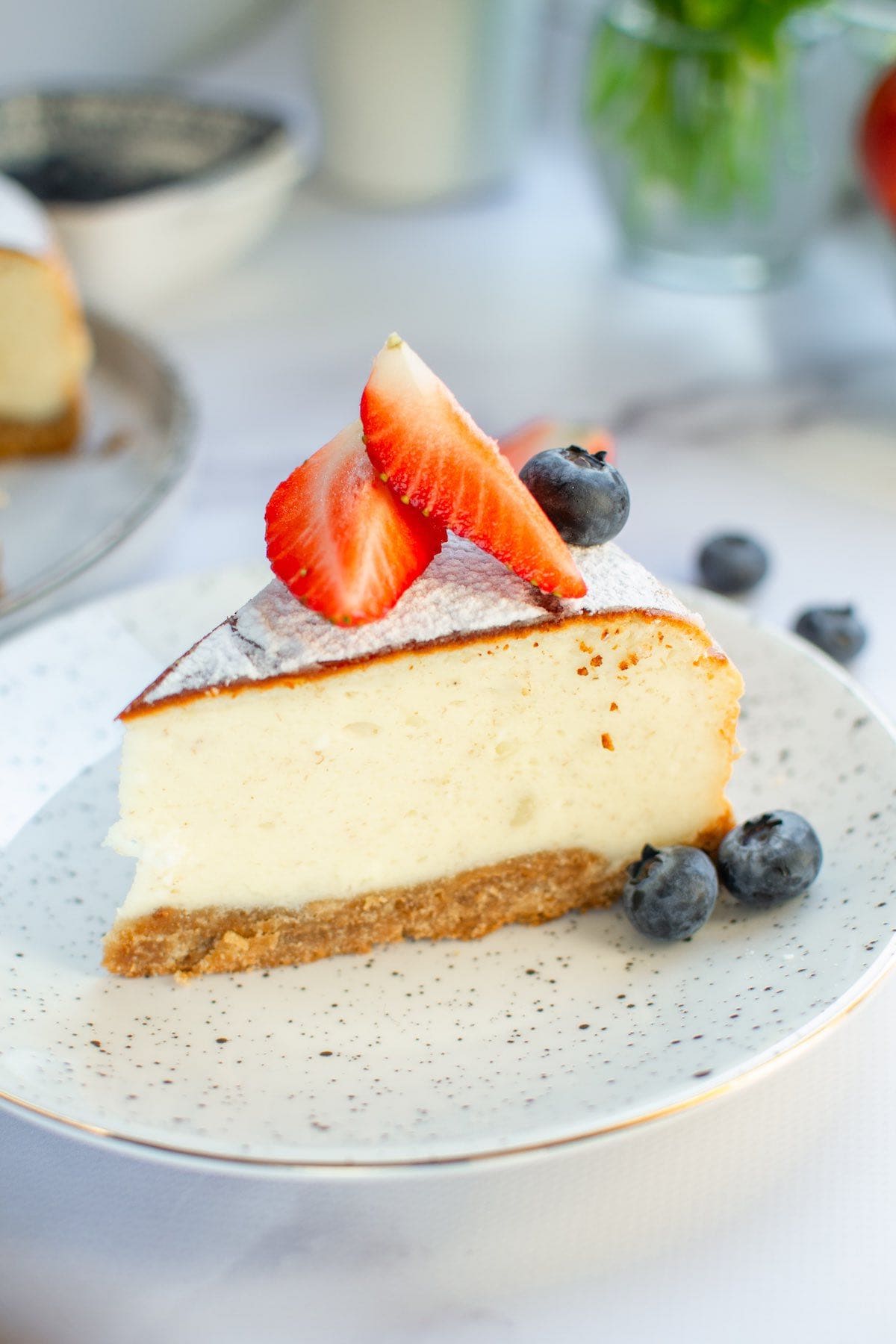
I never thought I’d be able to say this, but yes- protein and cheesecake really can belong in the same sentence! I first started experimenting with this protein cheesecake as a recipe in my first cookbook, but because it wasn’t perfected yet, it missed the cut. Luckily, I’ve finally perfected it, and it’s a family favorite high protein dessert.
Classic ingredients like cream cheese and Greek yogurt already pack in protein, and with just a few simple tweaks, I discovered a version that’s rich, creamy, and with plenty of protein. Now, this cheesecake is one of my family’s favorite sneaky treats- it’s so much like the original, my picky partner can’t even tell the difference!
Table of Contents
Recipe highlights
- Easy to make. No water baths, no par-baking, nada.
- Protein powder-free option. If you skip the protein powder, each slice still packs in 12 grams of protein.
- Crustless option. If you don’t want to make a crust or buy one, why not make this sans crust? It tastes just as delicious, and let’s face it- the filling is the best part.
Key Ingredients
Here are the main ingredients that go into this high-protein cheesecake. You’ll find the full printable list and measurements in the recipe card below.
- Greek yogurt. Either non-fat or regular Greek yogurt works. I like using non-fat yogurt as it contains about 3 grams more protein than the regular kind.
- Cream cheese. Softened to room temperature. I’ve tested several brands of higher protein cream cheese (Philadelphia 2 x Protein and Philadelphia Protein Low Fat) successfully. If you can’t find these, regular full-fat cream cheese works best.
- Protein powder. Protein powders behave differently when baked. I tested this using casein (Optimum Nutrition), brown rice (Growing Naturals), and whey protein powder (Optimum Nutrition). Only casein and brown rice protein baked well without affecting the texture. Whey protein didn’t set well and fell apart when slicing.
- Eggs. Room temperature, please.
- Sugar OR substitute. Any granulated sweetener works. I like to use white sugar, but when I keep the sugar and calories down, I like to use allulose.
- Cornstarch. Thickens the cheesecake filling.
- Crust. Another trick I use to add even more protein is to use my protein cookies in the crust (instead of Graham crackers or plain cookies). Of course, if you’re in a pinch, any store-bought crust works.
How to make a protein cheesecake
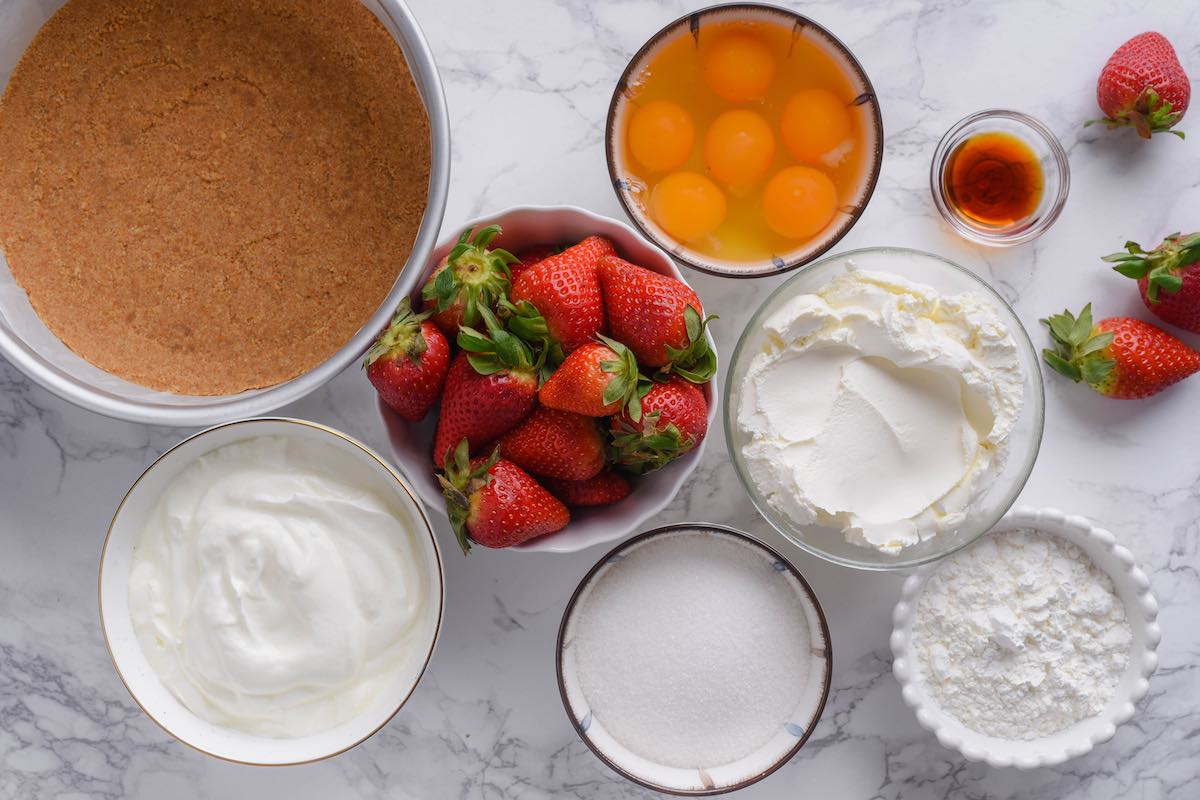
Step 1- Prep the crust. If you choose to make a crust, prep one that is enough to fit a 9-inch pie pan.
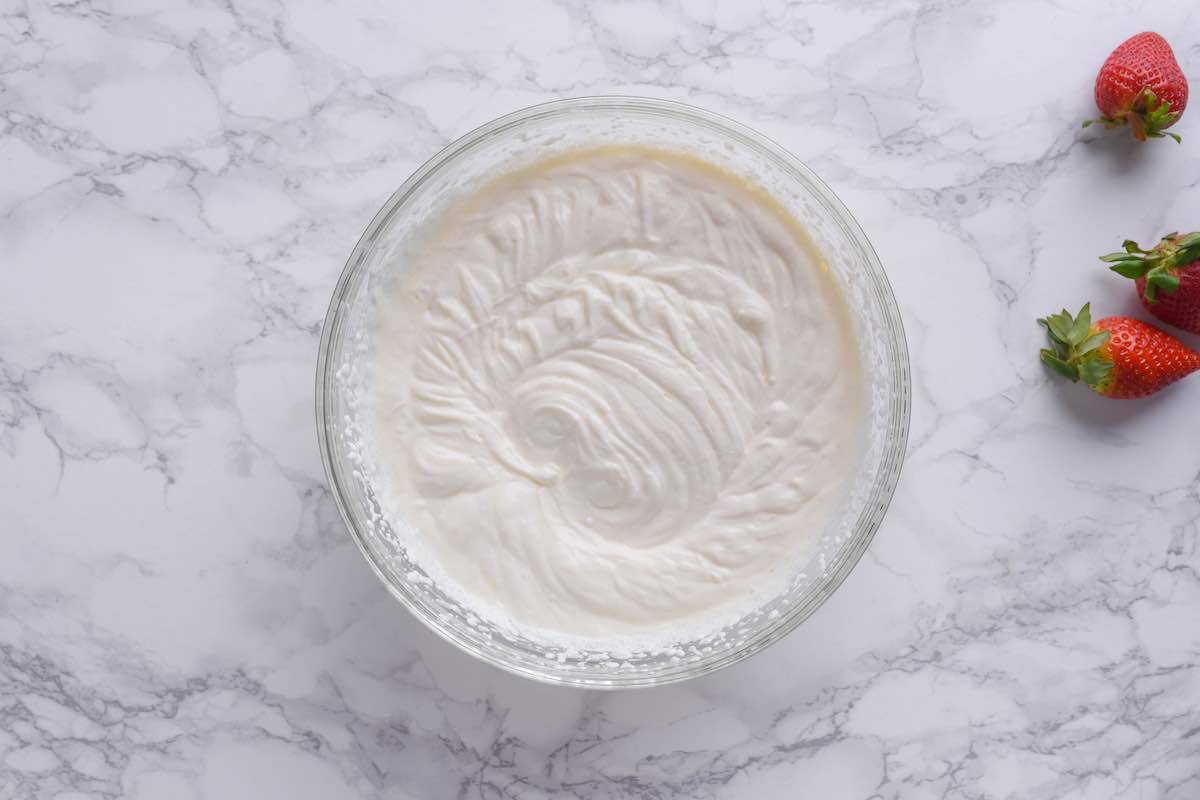
Step 2- Make the filling. In a mixing bowl, add the cream cheese and beat until fluffy. Slowly add the yogurt, then the sugar, eggs, and vanilla extract. Gradually add the cornstarch to prevent clumps from appearing.
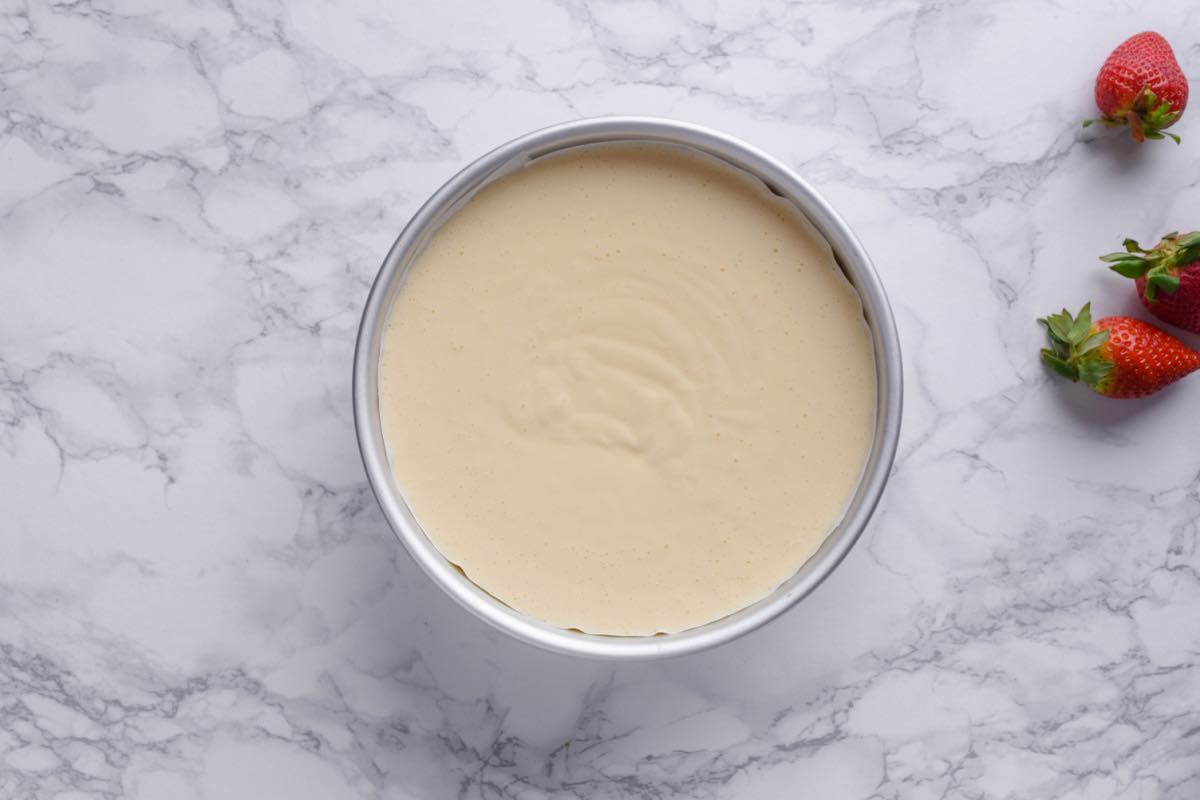
Step 3- Bake the cheesecake. Transfer the cheesecake filling to the crust and bake for 60 minutes or until the edges are set.
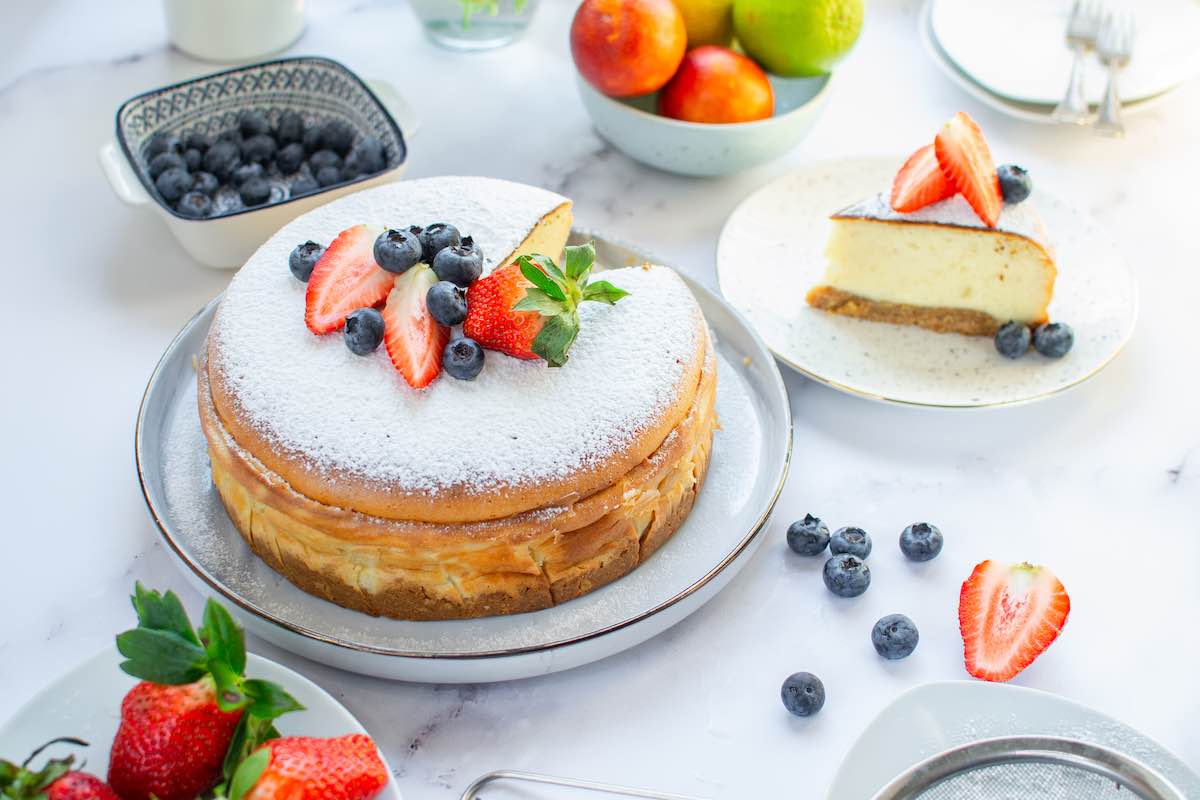
Step 4- Assemble. Dust the cheesecake with powdered sugar and chill until set.
How to add even more protein
Each slice of this cheesecake packs in around 30 grams of protein. However, you have the option to add even more protein to it.
- Make a protein frosting to top the cheesecake with. Whisk together non-fat Greek yogurt with protein powder and a touch of maple syrup or honey. Thin it out with more yogurt as needed.
- Swap out half the Greek yogurt for equal parts of non-fat cottage cheese. Be sure to blend it thoroughly first, or else there will be clumps.
- Drizzle peanut or almond butter over the top.
Arman’s recipe tips
- Keep an eye on the cheesecake as it bakes. If the middle continues to be a little too soft, cook it a little longer. Once it is firm to the touch, it’s fine to remove it from the oven.
- Always use room-temperature yogurt, cream cheese, and eggs. A trick I learned in culinary school (and took with me to develop all my cheesecake recipes). This promotes a smoother batter, less overmixing required (which adds air to the batter, which means cracking!), and also for even baking.
Frequently asked questions
I touched on it earlier, but the #1 reason for cheesecakes cracking is due to overmixing. Overmixing adds plenty of air to the mixture, which causes tiny bubbles to expand as it bakes. When it cools, the cracks appear. I know it sounds like an extra step, but please bring your chilled ingredients (yogurt, cream cheese, and eggs) to room temperature.
Yes, this can be baked crustless. Bake the filling in a glass baking dish (very important: glass promotes gentle, even baking and also no need to brown) for 45-50 minutes until the edges are slightly golden.
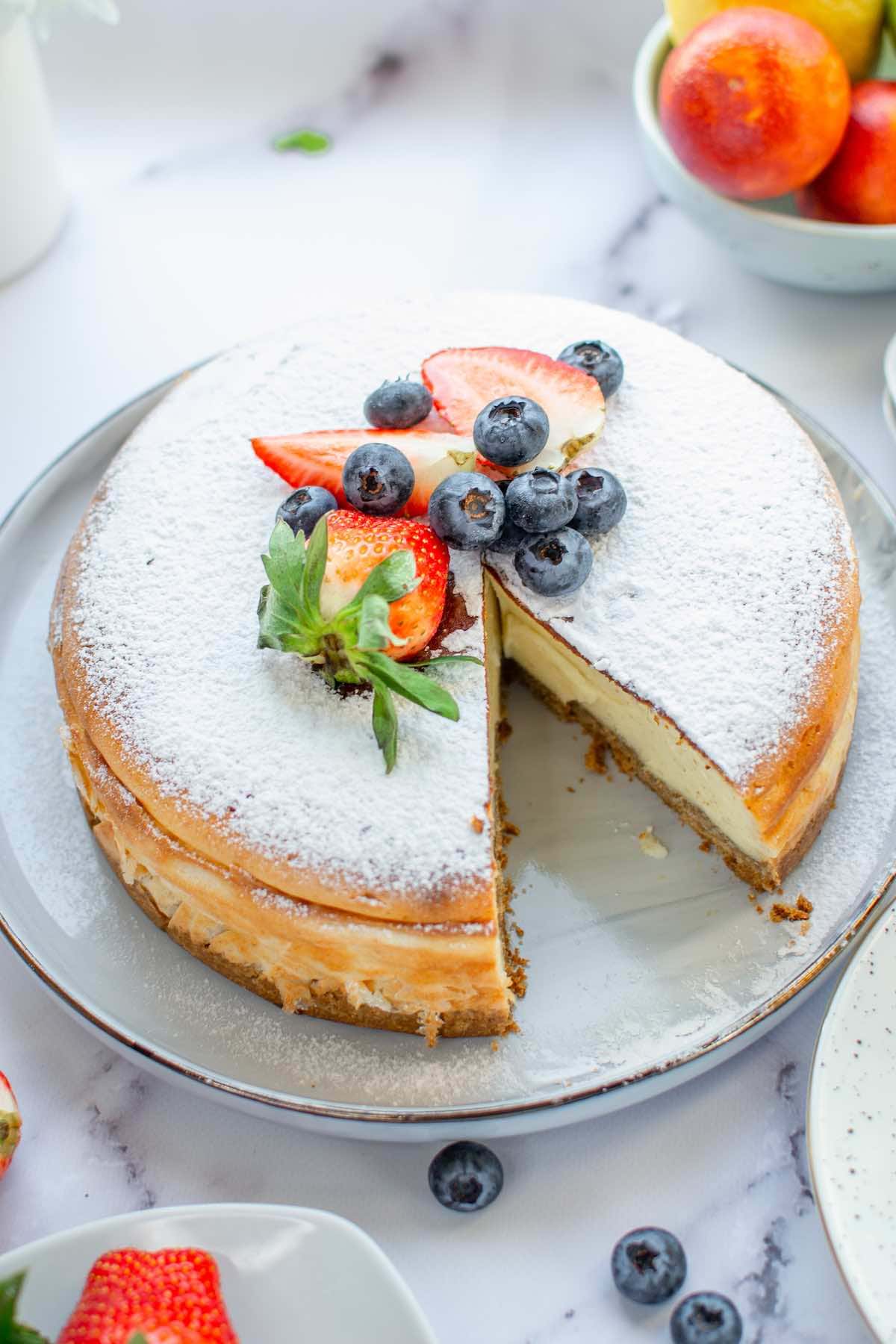
✅ Nutrition reviewed
Nutrition information has been reviewed by registered dietitian Felicia Newell, MScAHN, RD, CPT.
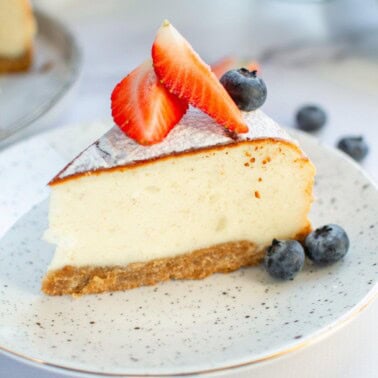
Protein Cheesecake
Video
Ingredients
- 3 1/4 cups Greek yogurt room temperature
- 14 ounces cream cheese * See notes, room temperature
- 6 large eggs whisked, room temperature
- 3/4 cup sugar or sugar substitute
- 1 cup protein powder
- 2/3 cup cornstarch
- 2 teaspoons vanilla extract
- 1/4 teaspoon salt
Crust
- 12 protein cookies crushed
- 5 tablespoons light butter melted
Instructions
- Preheat the oven to 160C/320F. Grease a 9-inch pie pan or springform cake pan.
- To make the crust, crush up your protein cookies and measure out 1 3/4 cups of them, and place them in a bowl. Add the melted butter and mix until combined. Transfer to the pan and press down into
- In a mixing bowl, beat the cream cheese until smooth and fluffy. Add the yogurt, then the sugar, eggs, and the vanilla extract. Gradually stir through the cornstarch, ensuring there are no clumps.
- Transfer the cheesecake mixture to the prepared crust and bake for 60-70 minutes, or until the edges are set.
- Once the cheesecake is baked, allow it to cool completely. Dust with powdered sugar and serve.
Notes
- Cream cheese macros: I used a protein cream cheese, which has twice the amount of protein as regular cream cheese.
- Protein powder optional: You can skip this completely and each slice will still have 12 grams each.
- TO STORE. Leftovers can be stored in the refrigerator, covered, for up to one week.
- TO FREEZE. Place the baked and cooled cheesecake in a shallow container and store it in the freezer for up to 6 months.
Nutrition
More high protein desserts
- Protein ice cream
- Protein muffins
- Protein banana bread
- Protein pudding
- Protein brownies
- Protein donuts
- Protein cookie dough
Originally published March 2023














My only question is if I eliminate the crust what would my carb/cal count most likely be? Thank you
Hi! You’d be looking at slices being 230-245 calories each and carbs around 18-20 grams.
Can I make these in muffin pans instead?
Hi Taylor, yes! I would use liners as well, and start checking them around the 20 minute mark as they won’t need as much time as the whole cheesecake. They’ll still be a little jiggly when you take them out but they should firm up as they cool. Let us know how you go!
Arman, I really enjoyed this cheesecake. I noticed on your raspberry cheesecake recipe you had a sauce, which I’ll try next time.
Hi Meredith- love to hear that! That sauce is one of my favorites, so please do try it out.
I’m thanking and giving this 5 stars because it doesn’t have cottage cheese! this looks amazing,and uses all the products I would when making a Ninja Creami minus the eggs.Although egg whiites are an amazing sorse of protein they unfortunately do not work well s an ice cream ingredient.So many other high protein cheesecakesunfortnately havecottagecheeseandI do not wantCottage cheese cake! thank you. idnotheardofhigh protein cream cheese before!
Diane, you are so welcome. I actually do have a cottage cheese cheesecake recipe too, but yes, not in this one! How did you enjoy the cheesecake? If you’d prefer a more traditional tasting one, you can make the cottage cheese one I have, but replace it with Greek yogurt (full-fat).
Perfection! I included a cup of lo-fat small curd cottage cheese, 1 cup of unflavored casein powder, 3/4 cup of stevia, vanilla and almond extract, and did the rest as instructed. My crust was the protein cookie recipe linked, with extra graham cracker and 2/3 cup of dark chocolate chips – baked the batter at 300F for 12 mins, let cool before pouring in cheesecake mixture.
The crowd went crazy! 🤪
Okay, I NEED to try your tweaks- it sounds delicious!!!
Where did you find protein cream cheese? What is the brand?
Hi Dina- Philadelphia has a protein cream cheese (labelled as 2 x protein on the container). I went to a Whole Foods event last week and they have two high protein cream cheeses entering the market in 2026 (they wouldn’t tell us the names but we did blind taste them, and… it was DELISH!)
5/5 I added lemon zest and juice to make it lemon cheesecake. Your other recipe is like this one, but this one has more volume which I love!
Greek youghurt…Its so horrible that in my country there is only “Greek type of youghurt”. I want to try really.
Greek type yoghurt is greek yogurt. It’s the same thing.
No, if the person who wrote is in Europe, it is very different. Greek yoghurt in the US has like 15 grams of protein per 4oz, in Europe “Greek type of yoghurt“ has the same amount of protein as regular one.
OP, if you live in Germany or if they have it in your country, you can try quark. It is very similar in protein content at 12 grams per 100 grams and they sell it in a variety of fat contents.
Looks good
Your instructions still don’t say to add the eggs anywhere. Not everyone will know when or where to add them and that would be a big loss.
Also the instructions state gradually stir through the cornstarch to ensure there are no lumps. I assume you then stir it into the cheesecake mixture?
Please , your readers are not always American centric, and I’m not entirely sure from where you post your beautiful recipes. so here is a respectful request:
please include metric measurements , or at least state how many mls of fluid is in your ‘cup’ measurement-because a ‘cup’ means different volumes across the world. So it becomes pot luck if your recipe does or does not work for me in Australia. Thanks though, I enjoy your posts.
Hi RMB- I appreciate this feedback. My team and I slowly working through every single recipe to provide metric measurements. With over 1500 recipes here, it’s taking some time. If you’d like specific measurements, you can always email me and I’ll send them to you if we’ve tested it and just not posted it yet 🙂
You add eggs in step 3. The same step he tells you to gradually stir in the cornstarch….
Pretty good. Made 3 times now. Using 4 tbsp of butter- cones out a tad more like graham cracker crust. Also let ingredients get to room temp and whisk eggs before blending. Adding optimum vanilla protein last. Also let rest at the top of the oven with door slightly open to avoid cracking. Great recipe!
Thanks for the feedback, Todd! I appreciate you sharing your variations 🙂